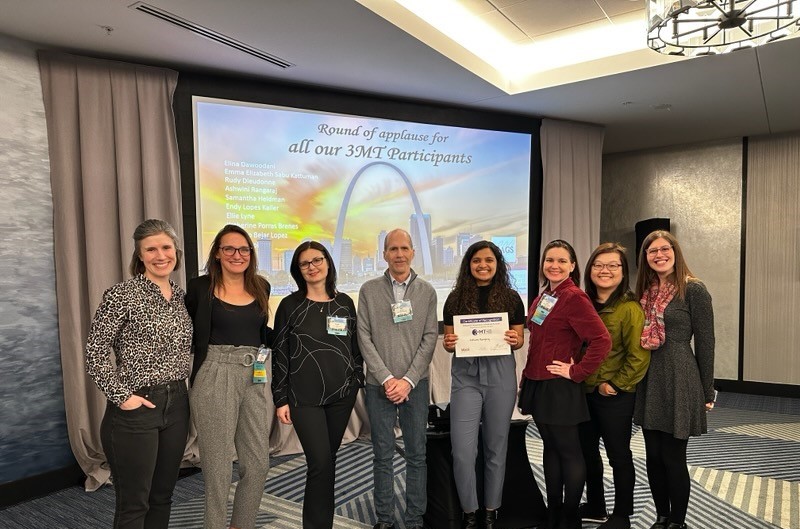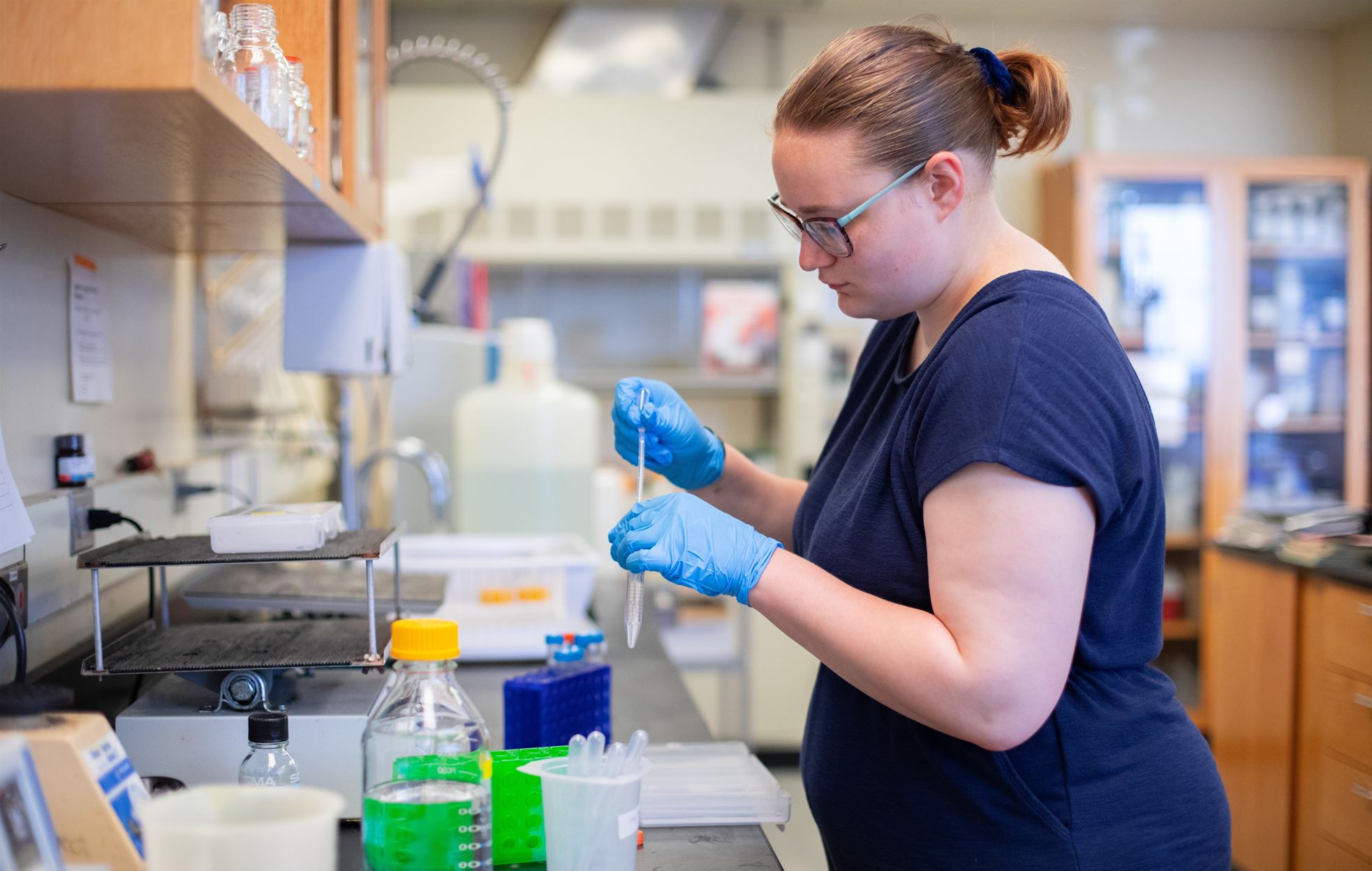Build Knowledge
- Acquire field-specific knowledge
- Find unique opportunities to hone research skills
- Complete training in essential professional competencies
Improve Performance
- Present your research publicly and prepare to publish
- Reinforce your learning through peer feedback
- Mentor junior researchers
Exceed Expectations
- Finish strong with a polished capstone
- Show your worth with an award or competitive funding
- Earn awards for excellence in teaching and research

Grad Success Program
This longitudinal program focuses on academic support for graduate students to help them build capacity in the area of preparing high quality dissertations, theses, and creative components. It maps the stages of progression toward a graduate degree with skill development opportunities available at the Graduate College and at ISU. Participation in the Grad Success Program includes registration for up to four one-credit courses. Students are not required to take the courses in chronological order. Participation in all courses leads to earning a Graduate Success Certificate.
Learn more about the Grad Success Program

Thesis/Dissertation
A suite of program activities support graduate students every step of the way through completing the crowning achievement of their graduate programs. Continuous, tailored support in research-related endeavors is available through individual writing assistance, document formatting review, writing retreats, bootcamps, workshops, downloadable toolkits, and more.
Visit the Thesis/Dissertation website

3MT: Three Minute Thesis
Master’s and doctoral students worldwide are celebrated in the Three Minute Thesis (3MT) competition for their exciting research. Engaging in 3MT aids students in refining their ability to summarize their research in three minutes in language that a general audience can grasp.
An 80,000 word thesis would take 9 hours to present. Your time limit...3 minutes. Are you up for the challenge?
Learn how to apply and see 3MT winners

Competitive Funding
Are you searching for your next big opportunity, or a way to stand out from the crowd? A competitive award, fellowship, or grant might just be perfect for you. Receive a curated list of potential graduate funding opportunities that match your academic level, discipline, and interests. Then get constructive feedback on your application materials and guidance for your submission.
Work with a Competitive Funding consultant

Professional Skill Training Course
We are offering GRST/MSE/IE/CBE 5800X: Introduction of Project Management for Thesis Research (1 credit, Fall 2025). This course adapts project management and time management tools to help you plan, organize, and execute your thesis research more effectively.
You will learn to create a project charter, build timelines and Gantt charts, strengthen communication skills, earn badges for your resume, and connect with peers in the Graduate for Advancing Professional Skills (GAPS) community.
Open to all engineering graduate students. No prerequisites, satisfactory–fail grading. Register now through ISU Course Registration. More details: www.gaps.iastate.edu; or contact Dr. Shan Jiang: sjiang1@iastate.edu

Coming Soon! Free E-Book for Scholars
The release of our new, free e-book, Surviving Research Publication: A guide for new scholars is slated for Spring 2026!
Sign up for a notification when the e-book becomes available.
Featuring three sections:
- Basics
- Chapter 1. Literature Reviews
- Chapter 2. Citations
- Chapter 3. Literature Searches (and Using the Library)
- Chapter 4. Demystifying the Publishing Process
- Chapter 5. Research Impact
- Ethics
- Chapter 6. Research Ethics, Regulations, and Protocols
- Chapter 7. Copyright Basics for Article Publication
- Chapter 8. Authorship: Rights, Responsibilities, and Embargoes
- Chapter 9. Plagiarism Tools
- Technology
- Chapter 10. Applications for Writing
- Chapter 11. Applications for Formatting
- Chapter 12. Formatting Text
- Chapter 13. Formatting Figures
- Chapter 14. Formatting Tables
- Chapter 15. Final Formatting
Research skills
| What is it? | How to Develop it? | Why is it Important? |
| Presenting oneself as a representative member of a profession and aligning one’s behavior to the declared standards of that profession. | Know and learn about the values and norms of the profession, striving to align with them in one’s role as a professional, and be alert to threats to the integrity of the profession and one’s own professional conduct. | Allows professionals to contribute to, and network within their professional community and can give one standing to ultimately shape the values and norms of their profession, which evolve along with developments in the broader world. |
| What is it? | How to Develop it? | Why is it Important? |
| The generation of novel ideas through re-examining assumptions, analytically deconstructing constructs and processes, and challenging conventional ideas. | Practice empathy, humble self-reflection, creative blending of interdisciplinary knowledge, and engagement with diverse perspectives. | Can inform effective problem-solving and lead to enhanced understanding of difficult questions and issues. |
| What is it? | How to Develop it? | Why is it Important? |
| The careful creation and handling of information in a formal context to maintain and preserve knowledge resources. | Understand how information is accessed and used, how it can be misused, and how it can be lost or corrupted. | It is necessary for ensuring that information is useful and available when needed, and that information cannot be misused or abused in harmful ways. It is especially important for private information protection, for transparency and accountability, and for quality assurance. |
| What is it? | How to Develop it? | Why is it Important? |
| Understanding the concept of intellectual property, the ability to identify intellectual property, and familiarity with laws, policies, norms, and ethics related to intellectual property. Also, the ability to control one’s own intellectual property and to make appropriate use of others’. | Developing this skill involves creating and formally claiming intellectual property; knowing the scope and limits of intellectual property rights across different contexts, such as legal jurisdictions; making use of others’ intellectual property; and being prepared to defend against infringement on intellectual property. | It is necessary for ensuring that appropriate compensation and credit are given to those who contribute to society through intellectual work. |
| What is it? | How to Develop it? | Why is it Important? |
| Practicing appropriate acknowledgment of contributors to written research. | Understand the values of a discourse community and the privileges associated with authorship and originality. Additionally, critically think about what constitutes a meaningful contribution in various domains, such as those described in the CRediT taxonomy. Authorship ethics also entails adhering to conventions of attribution and citation in writing. | This skill enables researchers to engage with colleagues in their community by giving credit to others' ideas and allows for historical tracing of idea development. |
| What is it? | How to Develop it? | Why is it Important? |
| An intangible benefit that is the outcome of someone’s work or effort. In academic and industrial professions, service refers to both the work and its benefits to the organization, its customers, or one’s colleagues. | Providing service relies on the ability to empathetically learn about the recipient’s needs and goals, then creatively contribute time, energy, and talent to supporting the achievement of those goals. | Can be a principal and/or supplemental component of a professional job or career, and expectations for service may be unspecified or vaguely specified. |
| What is it? | How to Develop it? | Why is it Important? |
| The ability to plan, execute, monitor, and report financial activities related to a project, group, or organization. | Understand how financial resources can be accessed and used to further the aims of the project, group, or organization. Practice transparency and accountability to stakeholders who invest resources and/or are impacted by the project. | This skill allows an individual to make and justify important decisions, determine the scope of initiatives, communicate priorities and values, and demonstrate their responsibility and trustworthiness. |
| What is it? | How to Develop it? | Why is it Important? |
| The ability to find funding opportunities and customer markets and to persuasively communicate the value of deliverables. | Assess the fitness of a project for one’s own goals and the mission of the funding source, conform to guidelines for submitting a grant application or project proposal, and use persuasive techniques to attract attention and motivate selection. | This skill allows individuals to directly contribute value to their organization and tangibly demonstrate the worth of their contribution. |
| What is it? | How to Develop it? | Why is it Important? |
| The ability to anticipate the amount of time needed for completing tasks, establish and continuously adjust priorities, and to balance efficiency with efficacy. | Monitor how one’s time is spent, reflect to identify waste and inefficiency, and evaluate the importance of tasks, especially when facing overload. Time management also involves reflecting on one’s personal relationship with time, such as the kinds of tasks that can be done during certain time periods (e.g., writing in the morning), the need for rest and leisure, and the amount of time one can remain focused on a particular task. | Time management is essential for professionals who are responsible for independently carrying out multiple complex responsibilities and leading teams. |
